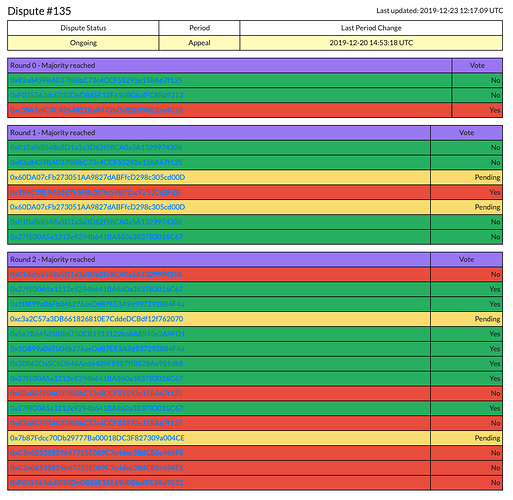EDIT / UPDATE :
- this is a long post that involves some other features too
- require 2/3 majority
- ability to withdraw
- incentivise “0” (unsure)
- limiting the amount of appeals is just one of the many features
What should happen unclear 51/49 swing cases? Appeal till you bleed ![]()
![]()
![]() or maybe there is a better way?
or maybe there is a better way?
As always thinking about enhancements, proposals, ideas. I’m keen to share my view and listen to your feedback.
I’m not expecting much support from this proposal. Nevertheless, I still believe it is worth it. Anyone can fork Kleros and implement their own parameters ![]()
Football analogy 


- When you play football, 5-a-side still remains football.
- When you do “3 corners = penalty” - football
- When penalty is a dribble, just like in hockey - football.
- Goalkeeper cannot throw the ball behind the middle line - football
- 80 minutes game with no extra time but clock stopping if pause longer than 10 seconds - football.
- Under 13yo, the bar is 2.2m - football.
It still remains football, regardless small variations here or there.
Similar analogy applies to Kleros, can tweak some parameters and it will remain Kleros: Telegram: Contact @kleros
I see Kleros a little bit like a protocol. Game theory. Shelling points. Crypto incentives.
Current Kleros situation
Parties in agreement: If there are no controversies, no dispute - the case does not go to arbitration, it doesn’t touch Kleros.
Jurors in agreement: If there are some controversies, the evidence should help jurors vote. If the case is 3-0 or 7-0 or anything other one-sided - it is simple, easy win.
Jurors not in agreement: blast from the past Robotina logo.
http://kleroscan.com/dispute/69
Round 0: 3-0
Round 1: 4-3
Round 2: 1-10
Round 3: 13-18
For me it was “NO” but I can easily imagine another highly disputable case, that can go one way or another.
Jurors not in agreement: currently happening Mysterium.
https://tokens.kleros.io/token/0x7560265d412d2a01ebeda2d408e5c46cedd12082e4dc3ba4d1f1ae54317dd676
Kleroscan: http://kleroscan.com/dispute/135
Current screenshot: https://imgur.com/a/pixbpxP (4 yes, 4 no, the remainder is pending, would be too many colors in this forum)
There can be cases with no clear consensus, where no amount of additional jurors or evidence that will make everyone agree.
There can be cases with emotional, spiritual, honor aspect where “money is not an issue” and dispute will continue until one party ![]()
![]()
![]() bleeds.
bleeds.
To have a limit of max 7 rounds of appeal can gives peace of mind, the worst case scenario is “it will cost us 100 ETH”
Crowdfunding 51/49 is a risky strategy. There is dozen of other potential reasons why case might not get crowdfunding. See also this thread: Proposal: Kleros Cooperative Coommunity Fund (KCCF) DAO and funding the appeals
Real-life analogy
You cannot go further than couple of steps:
- Local Court
- Regional Court
- High Court
- National Court
- Court of Appeal
- Supreme Court
- International Court (European Tribunal of Human Rights)
Similarly, at Kleros we can also limit the max 7 rounds.
(no need for jurorsForCourtJump)
Bleed no more
- Max 7 round of appeals
- Require 2/3 majority
What if no 2/3 majority is reached and the case is still swinging?
Coin flip, with the probabilities adjusted towards the jurors ratio in the final round.
Ability to withdraw
If no agreement is made after the final round, before the coin flip?
a) both parties can agree to withdraw?
b) either of the parties can withdraw?
Ability to withdraw (assuming mutual agreement):
c) at any stage
d) only at the final when no 2/3 majority is reached
Withdraw. Reassess. Provide a better solution. It may happen that during arbitration one or both parties realise that Kleros is NOT the best way moving forward.
Juror incentives - Reward distribution - OK to be not be fully sure?
Until recently it was all about coherence, Shelling Point, jurors voting like majority were rewarded.
I can totally imagine situation with not enough information, not enough clarity, parties being unhelpful with providing evidence, or maybe spam attack and fake news.
Jurors who are are unable to make decision with full confidence should be allowed to vote “0” without penalty.
In the current system “0” are penalised, their stake being lost no matter what.
Pros and cons
It has some advantages:
- avoiding bleed


 war of attrition…
war of attrition… - …situation where someone with deeper pockets will always outspent the other guy
- incentive for jurors think for themselves, not trying to predict what others will vote in 51/49 knowing that 2/3 majority is required
(more incentive to vote towards what they feel / perceive / think is fair, as opposed to what they think others will vote)
(definition of “fair” - I suggest best interest of humanity, society, justice as opposed to crypto term “coherence” or “Shelling point” - these still to be used but with the emphasis on fairness)
It has some disadvantages too:
- randomness (assuming coin flip at the final stage)…
- …but no so random, 7 rounds of voting didn’t reach decisive 2/3 majority…
- …the case was swinging, controversial, with a different set of jurors and more laborious work of lawyers (heliast.io anyone) I could go either way
- rethinking crypto-incentives of allowing “0” to not be penalized
- better to innovate on the side of adoption (more cases) rather than rethinking inventive model
Mars Robertson
(not PhD in law, pseudo quasi PhD in Online Trolling and Applied Crypto Economics)
PS. Initially, I wrote this post assuming max 5 rounds of voting. We can find a middle ground with max 6 but the principle remains the same. Avoiding bleed ![]()
![]()
![]()

